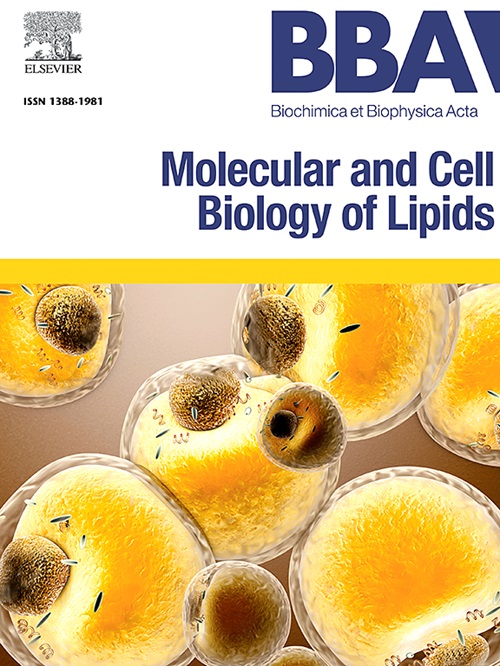Effect of glucose selenol on hepatic lipid metabolism disorder induced by heavy metal cadmium in male rats
IF 3.9
2区 生物学
Q2 BIOCHEMISTRY & MOLECULAR BIOLOGY
Biochimica et biophysica acta. Molecular and cell biology of lipids
Pub Date : 2024-12-13
DOI:10.1016/j.bbalip.2024.159589
引用次数: 0
Abstract
This study used 24 male rats to determine the protective effects of a new selenium molecule (glucose selenol) on cadmium (Cd) induced hepatic toxicity. The rats were randomly divided into four groups: control group, Cd group, Cd + 0.15 Se group, and Cd + 0.4 Se group. The results showed that glucose selenol supplementation alleviated the adverse impact of Cd on lipid metabolism, including decreased serum triacylglycerol and cholesterol levels. Transcriptome analysis revealed that, compared to the control group, Cd changed the expression of 1379 genes - discernibly affecting lipid metabolism pathways. Proteomic analysis primarily indicated alterations in lipid metabolism-related pathways. In conclusion, glucose selenol restored lipid metabolism disorders induced by Cd, thus rescuing hepatic damage. This integrated analysis identified the influence of glucose selenol on Cd-induced hepatic toxicity and provided its potential application prospects in alleviating the impact of heavy metal pollution, such as Cd, on human health.

葡萄糖硒醇对重金属镉诱导的雄性大鼠肝脂代谢紊乱的影响
本研究用24只雄性大鼠研究了一种新的硒分子(葡萄糖硒醇)对镉(Cd)肝毒性的保护作用。将大鼠随机分为4组:对照组、Cd组、Cd + 0.15 Se组、Cd + 0.4 Se组。结果表明,添加葡萄糖硒醇可减轻镉对脂质代谢的不利影响,包括降低血清甘油三酯和胆固醇水平。转录组分析显示,与对照组相比,Cd改变了1379个基因的表达-明显影响脂质代谢途径。蛋白质组学分析主要表明脂质代谢相关途径的改变。由此可见,葡萄糖硒醇可恢复Cd所致的脂质代谢紊乱,从而挽救肝损伤。该综合分析确定了葡萄糖硒醇对Cd诱导的肝毒性的影响,并提供了其在减轻Cd等重金属污染对人体健康影响方面的潜在应用前景。
本文章由计算机程序翻译,如有差异,请以英文原文为准。
求助全文
约1分钟内获得全文
求助全文
来源期刊
CiteScore
11.00
自引率
2.10%
发文量
109
审稿时长
53 days
期刊介绍:
BBA Molecular and Cell Biology of Lipids publishes papers on original research dealing with novel aspects of molecular genetics related to the lipidome, the biosynthesis of lipids, the role of lipids in cells and whole organisms, the regulation of lipid metabolism and function, and lipidomics in all organisms. Manuscripts should significantly advance the understanding of the molecular mechanisms underlying biological processes in which lipids are involved. Papers detailing novel methodology must report significant biochemical, molecular, or functional insight in the area of lipids.

 求助内容:
求助内容: 应助结果提醒方式:
应助结果提醒方式:


